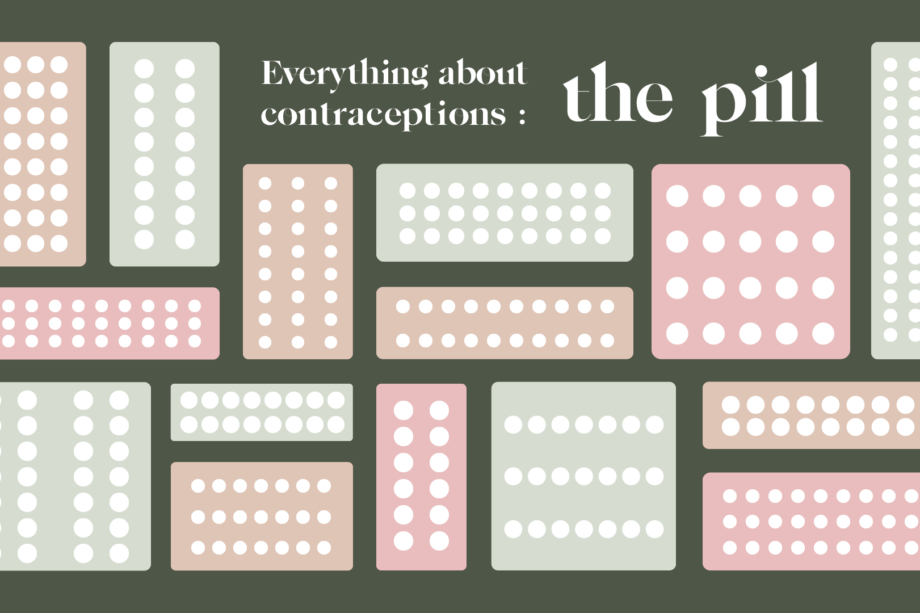Oh la pilule contraceptive… rebaptisée ” la révolution sexuelle ” Elle a fait son chemin dans la vie de nombreuses femmes. Nous avons décidé de contacter ce compte fantastique et très informatif sur instagram géré par deux femmes très iconiques : Maëlle et Florette aka @_mavieapres sur instagram. Leur objectif principal est d’aider les femmes à faire la transition après la contraception. Nous leur avons posé quelques questions sur la pilule afin de sensibiliser et aider les personnes qui se demandent de quoi il s’agit vraiment.


Why take the pill ?
The pill is one of the hormonal contraceptive methods available to people who do not wish to become pregnant. It has a reliability rate in practice of 93% calculated with the PEARL index (source: WHO). Therefore, it may seem relevant and ideal for some people, for contraceptive purposes.
Why are the positives an the negatives on taking the pill ?
Positive:
- Its reliability rate is very good (see PEARL index).
- This contraception does not depend on our ability to understand our cycle (so it may seem “simpler” and less restrictive at first)
- It can provide momentary relief of certain symptoms (in the case of PCOS or endometriosis for example) BUT it does not offer any real long-term solutions.
Negative:
- It inhibits the physiological functioning of the menstrual cycle naturally
- We ingest far more synthetic hormones than the body produces naturally
- It can inhibit a part of us, because of the control which is made on our hormones (moods, libido, envy…)
- It can lead to side effects under pill (migraines, pain, acne, depressive states…)
- You must remember to take it every day, at a fixed time
- It is again a contraceptive burden that falls solely on the woman
What are the different kinds of pills ?
There are two types of pills:
- Progestin-only pills: they contain only synthetic progesterone. They act in particular on the cervical mucus (fluid which helps the spermatozoa to swim to the ovum) by making it thicker, thus less penetrable. The lining of the uterus also becomes unsuitable for the implantation of an embryo. These pills do not necessarily block ovulation; this will depend on the dose of hormones and the type of progestin used.
- Estrogen-progestin pills: They may also contain synthetic progesterone and synthetic estrogen. They are called “combined pills” and act on both the pituitary gland (brain) and the cervical mucus. These two synthetic hormones will block ovulation. In addition, the cervical mucus will thicken and block the passage of spermatozoa. These pills will also modify the terrain of the uterus, making it unviable for the implantation of an embryo.
What are the advantages of the different types of pills?
Progestin-only pills are a reliable form of contraception that can reduce bleeding and period pain. However, some people experience side effects: bleeding while taking the pill, missed periods, weight gain, acne problems, etc.
Estrogen-progestin pills are also a reliable form of birth control and reduce period pain. People with acne notice an improvement in pimples (however, keep in mind that the problem is not solved, it is simply masked!). Beyond that, people taking this type of pill may experience headaches, bleeding outside of the period, changes in weight and libido, vaginal dryness, etc. They can also cause thrombosis.
Who is the pill for?
Especially for the estrogen-progestin pill, to all menstruating people who do not smoke, who are not at risk of thrombosis or phlebitis, high blood pressure, diabetes, cholesterol, breast cancer, etc. Talk to your doctor!
What is the difference between each generation of the pill?
The different generations of pills are distinguished by the type of progestins used:
- 1st generation are not marketed in France since 2016
- 2nd generation containing levonorgestrel
- 3rd generation containing desogestrel, gestodene, norgestimate
- 4th generation contain drospirenone, chlormadinone acetate, dienogest.
What is the effect of the pill on periods ?
It stops the “real” periods, those that are induced by the physiological course of the natural cycle. In fact, the natural course of the cycle is governed by the hormonal ballet that takes place throughout the cycle. Thus, at the beginning of the cycle, the body prepares for ovulation (with the production of estrogens), and once ovulation has occurred, the production of progesterone takes over thanks to the corpus luteum (the corpus luteum is the follicle that expelled the ovum). If the ovum is not fertilized within 12 to 18 hours after its expulsion, the production of progesterone will be maintained only for 12 to 16 days after ovulation, once this period has passed there is a global hormonal drop (estrogen and progesterone) and this is what triggers the period. To learn more about the hormonal process during the cycle, you can read our article on this subject.
Real menstruation always follows ovulation, but on the pill there is no ovulation. Instead, on the pill we speak of deprivation periods (on some pills there are no periods at all). These withdrawal periods have no meaning from a physiological point of view, they were introduced only to reassure women by creating monthly bleeding.
Do you have anything to add ?
The pill is primarily a means of contraception, for which it should be prescribed as a first-line treatment. In fact, prescribing the pill for other problems such as acne, painful periods or irregular cycles has no long-term beneficial effect. Taking the pill can certainly have a temporary effect on these symptoms but it does not solve the problem at the root, it only camouflages it. We are not anti-pill and we respect the choice of each person, nevertheless we are against misinformation on this subject.
Too many practitioners still present the pill as the only solution to cycle-related problems, without really trying to help patients work on the core of the problem.
The avenues of reflection that we can offer you:
- Acne problem? Acne is a symptom. If it is present, it indicates an internal imbalance on which we can work in depth (lifestyle, emotional sphere, diet, sleep, digestive health…)
- Painful periods and/or heavy periods? They are also a message from the body that can indicate an imbalance on which we can try to work at the root level to restore a balance (hormonal imbalance, micro-nutritional deficiencies that aggravate the pain, chronic stress…)
- PCOS or endometriosis, is the pill the only solution? Once again, here the pill will only camouflage the symptoms. This may be beneficial for some women, for a certain period of time, but you may also want to find real natural solutions, to learn to live more serenely with your cycle. For this, and as for other problems, do not hesitate to turn to practitioners such as naturopaths trained in these problems around the cycle, who will be able to guide you and give you the right tools to move forward. Discover how naturopathy can help you with our article.
By the way, if you want to stop taking the pill (or any other hormonal contraceptive) don’t worry, you can accompany your body to make this transition smoothly and serenely. My Life After is there for that!
Articles mentioned



